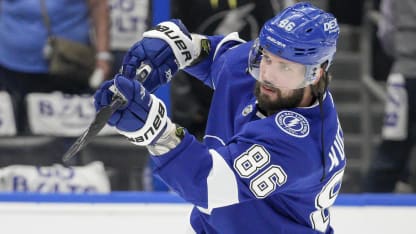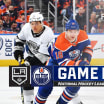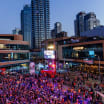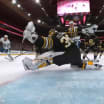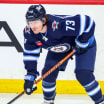Kucherov leads the Stanley Cup Playoffs with 22 points (five goals, 17 assists) in 13 games. He had three assists in a 4-2 home win against the Islanders in Game 2 on Tuesday.
He didn't play during the 56-game regular season but was back for Game 1 against the Florida Panthers in the Stanley Cup First Round.
"It is pretty remarkable what he's been able to do after really nothing, not playing at all for a full season, really wasn't on the ice much until the very end of the season," Tampa Bay center Blake Coleman said. "Not many guys are going to take that much time off and come back and lead the playoffs in scoring. He's just a special, special player."
The Lightning didn't know if Kucherov would make it back for the start of the playoffs. They knew it was a five-month recovery from the hip labrum tear surgery based on history; former Tampa Bay forwards Ryan Callahan and Ben Thomas each had the same surgery. So did active centers Brayden Point and Yanni Gourde.
Five months would have taken Kucherov to the end of May, the start of the second round.
"We kind of had some familiarity with the rehab process, how grueling it can be, the timelines, and also the uncertainty," Lightning general manager Julien BriseBois said.
Kucherov was skating by mid-March and participating in practice drills and morning skates by mid-April. He was cleared to take contact in early May. He recovered quicker than Point, Gourde, Callahan and Thomas.
"Not only did he come back faster," BriseBois said, "it looks like he's playing at the high level that he's accustomed us to over the years."
Kucherov tried to keep his mind fresh during his rehab by staying around the team as often as he could when they were home.
"Hockey players, their shelf life is their 20s, and if you're lucky you get to play into your early 30s now, and if you lose a whole year that's got to be tough," Tampa Bay coach Jon Cooper said. "I understand players are getting paid, but there's so much more to it. It had to be a grueling time to sit out and rehab not having any control if your team is going to make the playoffs, because that's the only way you get to play."
Kucherov tried to help his teammates when he could, talking to them before and after games, giving tidbits of information from what he was seeing. He tried to help himself by paying close attention to the games, seeing plays he didn't previously realize were available and gaining a better understanding of how defenses play against the Lightning.
"I think I got better," Kucherov said.
His home life was a big part of his rehab too, getting to spend time with his son, Max, which he normally would not be able to do during the regular season.
"Being with my family, seeing my son grow, that helped me a lot to get away from the game a little bit and thinking too much of it," Kucherov said. "I think I got a lot stronger mentally."
Tampa Bay's NHL salary cap situation benefited with Kucherov on long-term injured reserve for the season; the Lightning were allowed to exceed the $81.5 million cap by his $11.5 million cap charge.
Without the salary cap relief, they would have had to do some roster overhauling to become compliant before the season began. It's unlikely they would have had the space to acquire defenseman David Savard in a trade with the Columbus Blue Jackets on April 12.
BriseBois said the NHL investigated Kucherov's long-term injured reserve situation and approved it based on the justification for the surgery and the appropriate timelines from recovery to rehab to return to play. But the trade-off was playing the entire regular season without the NHL's third-leading scorer from 2015-20 (464 points; 183 goals, 281 assists in 381 games). Kucherov also led last postseason with 34 points (seven goals, 27 assists) in 25 playoff games, when Tampa Bay won the Stanley Cup.
"Missing a whole year, you ask any player, you don't want to be that guy," Kucherov said. "I didn't do it on purpose. I had to do the surgery. I had to go through the whole rehabilitation. When the time came that I was ready to play, it was the playoffs."
The Lightning are still playing largely because Kucherov is.
"I didn't know how things would unfold," BriseBois said. "I don't think they could have unfolded any better. When I was looking at all the possible scenarios and all the possible outcomes, none of them were as good as this one."
